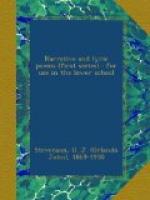And now he feels the bottom;
Now on dry earth he stands;
535
Now round him throng the Fathers
To press his gory hands;
And now, with shouts and clapping,
And noise of weeping loud,
He enters through the River-Gate,
540
Borne by the joyous crowd.
LXV
They gave him of the corn-land,
That was of public right,[81]
As much as two strong oxen
Could plough from morn till
night; 545
And they made a molten image,
And set it up on high,
And there it stands unto this, day,
To witness if I lie.
LXVI
It stands in the Comitium,[62]
545
Plain for all folk to see;
Horatius in his harness,
Halting upon one knee:
And underneath is written,
In letters all of gold,
550
How valiantly he kept the bridge,
In the brave days of old.
LXVII
And still his name sounds stirring
Unto the men of Rome,
As the trumpet-blast that cries to them
560
To charge the Volscian home,[63]
And wives still pray to Juno[64]
For boys with hearts as bold
As his who kept the bridge so well,
In the brave days of old.
565
LXVIII
And in the nights of winter,
When the cold north winds
blow,
And the long howling of the wolves
Is heard amidst the snow;
When round the lonely cottage
570
Roars loud the tempest’s
din,
And the good logs of Algidus[65]
Roar louder yet within;
LXIX
When the oldest cask is opened,
And the largest lamp is lit
575
When the chestnuts glow in the embers,
And the kid turns on the spit;
When young and old in circle
Around the firebrands close;
When the girls are weaving baskets,
580
And the lads are shaping bows;
LXX
When the goodman mends his armor,
And trims his helmet’s
plume;
When the good wife’s shuttle merrily
Goes flashing through the
loom: 585
With weeping and with laughter
Still is the story told,
How well Horatius kept the bridge
In the brave days of old.
—Macaulay
[1] Lars. Lord or Chieftain.
[2] Clusium. The modern Chiusi.
[3] Nine Gods. The chief Gods of the Etruscans were nine in number.
[4] trysting day. A day appointed for meeting.
[5] Volaterrae. The modern Volterra. The walls of the ancient fortress were built of enormous blocks of stone fitted together without cement.
[6] Pisse. Pisa
[7] Massilia. The modern Marseilles, originally a Greek colony and a flourishing commercial centre. triremes. Vessels with three banks of oars on each side. fair-haired slaves. Slaves from Gaul.




